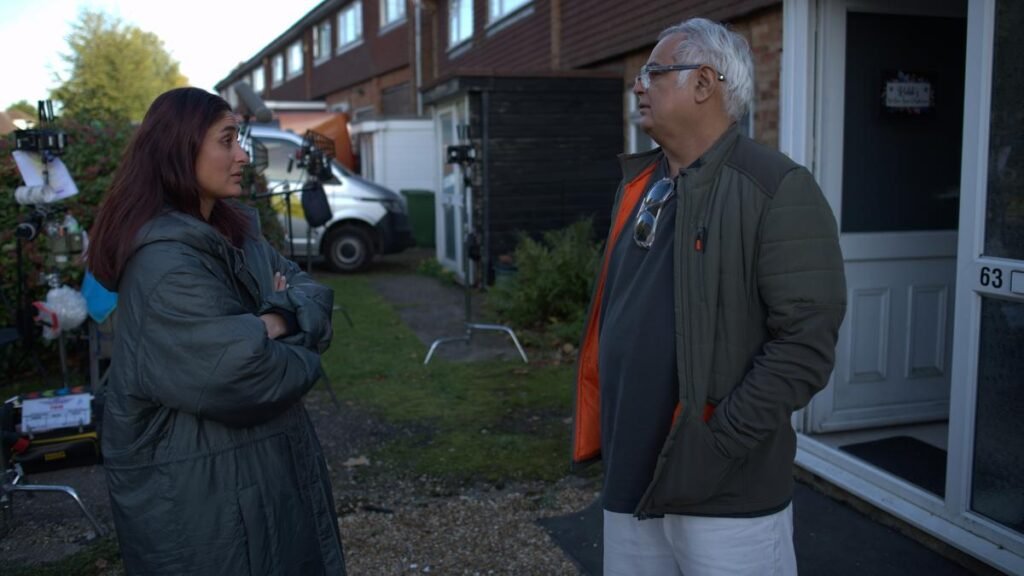Kareena Kapoor Khan and Hansal Mehta on the sets of ‘The Buckingham Murders’
| Photo Credit: Special Arrangement
When writer Aseem Arora approached Hansal Mehta in 2018 with the story of The Buckingham Murders, the director, known for looking at the lives of those living at the margins of society with an empathetic gaze, saw it as a relevant exploration of migrant lives using the murder mystery as a propulsion to tell the larger story of growing fissures in the salad bowls of the world.
Led by Kareena Kapoor Khan, the film has garnered praise from the critics and a section of the audience but the risks that Mehta has taken in telling a pensive story with a star indicate that he made it for the OTT audience. Denying the perception, Mehta says he doesn’t like to equate storytelling with box office but admits that the film recovered its cost before the theatrical release, allowing him the cushion to make the film with honesty. “I could subvert like I always do,” says Mehta over a telephone call from London.
Usually, he explains, what happens when a Bollywood film is shot in London, it doesn’t provide the feel of the place because everybody speaks in Hindi, dress like a ramp is waiting for them, and are far removed from the people who live in the country. “The general perception is that Indian producers make films in the UK for the country’s attractive subsidy. While we availed the subsidy, we made a quintessentially British film. It is like a new age, crossover, diaspora film. I wanted to present the ordinary lives in London. So there are no big mansions and castles. The story unravels in small, dingy, and messy spaces to generate a very lived-in experience.”
Hansal Mehta on the sets of ‘The Buckingham Murders’
| Photo Credit:
Special Arrangement
Working with Kareena, Mehta says, was a “joyous experience”. “She is instinctive and sharp. She would stay back to give cues to other actors. It is amazing to have a star not acting for the camera. She had internalised the character so much that she was unconscious of the camera’s presence.”
By a strange coincidence, Kareena is the third K, after Kangana Ranaut and Karishma Tanna who came out of their comfort zone under the direction of Mehta. “Comparing them would be unfair but whether star or not, the hunger to go beyond a set image is always there in actors. I am happy being a vehicle to channelise that drive and showcase it to the world.”
Excerpts from an interview:
Kareena gets a shade overdramatic in her performances. How did you help her get the pitch right?
I think we were in sync. We read a lot together to find our answers to the tone and the pitch. One of the things that I told her when we first met was that one of her films that affected me the most was Govind Nihalani’s Dev where she made a big impact with her quiet performance despite being in the company of Amitabh Bachchan and Om Puri. In the film, she lives in a chawl that gets engulfed in communal violence. The scene where she goes to the police station to say she knows the person who did it stayed with me. Here is an actor who could switch to a different mode and internalise the character quite easily if the right director and story came her way.
Your stories are redolent with the pain of the migrant and always accommodate the point of view of the other…
Whether it is Citylights, Dil Par Mat Le Yaar, Shahid, or even Aligarh, displacement has been a constant theme in my work. A lot of it has to do with upbringing. Many of us spend a lot of time with migrants but when we tell their stories we look at them with rose-tinted glasses.
My sister lived in London for 20 years and I spent time observing the diaspora. Every society has two distinct parts: people who belong and the others. I have always been interested in the stories of others — people who live in my city but are othered because of their socioeconomic status or cultural differences. It is also because of my experience in the film industry. I have never been part of a clique or a camp. I have been part of the industry and yet seen as an outsider. Telling my kind of stories is still a struggle. I am a bad actor but I can live through my characters.
Kareena Kapoor Khan and Hansal Mehta on the sets of ‘The Buckingham Murders’
| Photo Credit:
Special Arrangement
But in ‘The Buckingham Murders’, you choose to tell the story through one who belongs or is the lesser other…
I wanted to explore what happens when you put yourself in place of the other. That is the real test of empathy. If you are a Hindu and the other is a Muslim, my question is can a Muslim not love? Can a Muslim not hate? Can a Muslim not get angry? Because they are the other, we feel they would not do what we do.
Our morning and evening tea conversations revolve around what is happening in society. She is an economist who works in the social sector and travels across cultures. I get a lot from the reality she experiences on the ground. Citylights is a big example of how her inputs inform my stories. Deepak And Rakhi, the protagonists, were based in a village in Rajasthan where Safeena’s programme was taking place. As I observed people there, the film became less of a remake of Metro Manila. Similarly, in The Buckingham Murders, the plot is just a means to explore social structures.
In the case of ‘TBM’, comparisons were drawn with Kate Winslet’s ‘Mare of Easttown’.
It could be the other way around as TBM was registered with the Script Writers’ Association in 2018 while Mare of Easttowncame out much later. A grieving mother at the centre of a detective story is a common theme….
It seems Kareena said yes after she watched Kate’s performance!
This you have to ask her, all I can say is she has seen 25 years of stardom. Now, she can take it to the next level. This is just the beginning.
Hansal Mehta on the sets of ‘The Buckingham Murders’
| Photo Credit:
Special Arrangement
Tell us about your upcoming web series on Gandhi…
It is an adaptation of Ramchandra Guha’s books on Gandhi. Applause Entertainment had acquired the right to turn them into a three-part series and had cast Pratik Gandhi as Mahatma. Many feel that I picked him for the role considering our fruitful association in the past but in this case, he recommended my name to Sameer Nair of Applause.
How will you present the Mahatma to this generation?
There are two contrasting narratives on Gandhi; one sees him as a deity and the other as a demon. I feel the reality lies somewhere in between. The human story is important for our times as it reminds us that we all have a Gandhi within us. It is an ordinary man’s struggle against injustice, a voyage of self-discovery. The scale is epic, but essentially, it is his personal story that I intend to tell. The show will hopefully make people realise his relevance to our times.
Published – September 25, 2024 12:18 pm IST

